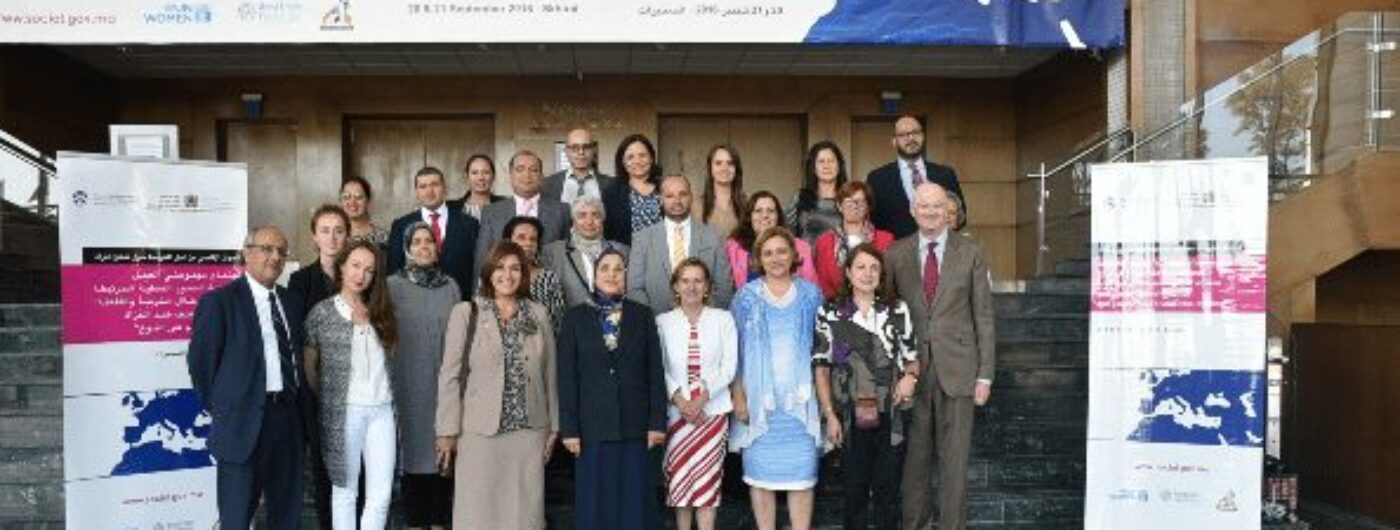
UfM countries and key stakeholders call for increased and coordinated efforts to end violence against women and girls and gender-based stereotypes in the Euro-Mediterranean region
“Violence against women and girls is a grave violation of human rights and human dignity. Further to preventing women from a full participation in the society, violence has an impact and a cost which extend to the family, to children and to the whole society”, said Senior Deputy Secretary General Ambassador Delphine Borione during the meeting.
Rabat, 21 September 2016.
Under the framework of the Union for the Mediterranean (UfM) Regional Dialogue on women empowerment, and as a continuation to the previous meetings held in 2016 in Barcelona, Paris and Amman, two working group meetings were held the 20 and 21st of September in Skhirat, Morocco to review and discuss the efforts made in combating violence against women and gender stereotypes in the Euro-Mediterranean region. They provide concrete recommendations and proposals of actions for the upcoming Ministerial Conference on strengthening the role of women in Society foreseen in 2017.
During the two days meeting, participants stressed the importance of a comprehensive approach to tackle the issues of violence against women and gender stereotypes and the necessity to improve the coordination and partnership between the key actors concerned, including media and civil society. They identified social and cultural norms, the challenge of impunity and the enforcement of laws among the main and urgent issues to be addressed. Experts addressed a number of other key recommendations, which included improving research and data collection, strengthening the regional cooperation between countries and with key stakeholders, and promoting exchange of success stories and lessons learned.
The Union for the Mediterranean countries have affirmed international and regional obligations and have adopted legal measures combined with national strategies that build a framework for combatting Violence Against Women and Girls (VAWG) and gender stereotypes. As such, the UfM labelled in June 2014 the “Forming responsible citizens” project, promoted by Ideaborn, which aims to contribute to the prevention of violence against girls and women through the implementation of a renewed civic education curriculum in Morocco, Tunisia and Egypt. [include hyper-link to project]
However, women across the region are still subjected to physical, sexual, psychological and economic violence, regardless of their income, age or education. In addition, the regional context of conflict, political transitions and austerity have led to increased VAWG. On the other hand, traditional gender roles and stereotypes continue to have a strong influence on the division of roles between women and men in the home, in the workplace and in society at large, which exclude women from having access to the same opportunities and support as men.
Hosted by the Moroccan government, the meetings gathered H.E Bassima Hakkaoui, Minister of Solidarity, Women, Family and Social Development of Morocco, Ambassador Delphine Borione, UfM Senior Deputy Secretary General, H.E Rupert Joy, Ambassador, Head of EU Delegation in Morocco, Dr. Maya Morsy, President of the National Council for Women in Egypt, Amb. Mona Omar, Chair of International Relations for the National Council for Women in Egypt, and M. Mohammad Naciri, UN-Women. The working group on stereotypes was co-chaired by Morocco and the Anna Lindh Foundation, and the one on combating violence was co-chaired by Egypt and UNWomen.
The Working Groups took place under the framework of the Third UfM High-Level Conference on Women Empowerment. The Conference will take into account these new challenges in the perspective of the upcoming Ministerial meeting on Strengthening the role of women in Society, which is expected to take place in February 2017.

